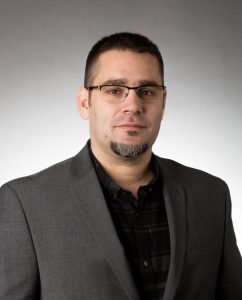Education doctoral alumnus discusses his Snowbird Day School project, reflects on years at Carolina as ‘tremendous time of growth’

The Snowbird Day School closed in 1963 – but it still has a tremendous influence on the small western N.C. community of Tuti yi. About 550 Cherokee Indian children attended the school, and 80 of those former students are still living. Trey Adcock, who received his doctoral degree in education from the University of North Carolina at Chapel Hill, wants to collect and preserve oral histories and artifacts that will, ultimately, share the Snowbird Day School’s history with the state. He has received a $50,000 Whiting Public Engagement Fellowship for 2018-19 to support those efforts.
Adcock, an enrolled member of the Cherokee Nation, said the project is a “culmination of my personal identity and professional experiences starting with my time as a public school teacher.”
Adcock is an assistant professor in the Interdisciplinary Studies Program and the director of American Indian and Indigenous Studies at the University of North Carolina at Asheville. In his answers below, he discusses his work and how his experiences as a doctoral student at UNC-Chapel Hill contributed to his current project.
What should people know about your work, specifically your work supported by the Whiting Foundation fellowship?
I think what I would want people to know is that it is community-based and community-directed. The initial idea for the project came from the community and much of the work being done on the project continues to be directed by various community members. One of my favorite aspects of the project is seeing young people from the community be involved through interviewing family members, digitizing family photos and then helping design multimedia to tell the story of the Snowbird Day School.
Are there any specific examples of support – professional development, mentoring, other – that helped you advance your academic and professional goals?
The current project I am working on, Tuti Tsunadelogwasdi Uninohelv (Stories of the Snowbird Day School), is a culmination of my personal identity and professional experiences starting with my time as a public school teacher. I got a chance at UNC-Chapel Hill to explore my interest more deeply and expand my knowledge bases. For this particular project, there are experiences at UNC-Chapel Hill that have contributed directly to this project, such as being a teaching assistant on the Driving Through Time: The Digital Blue Ridge Parkway project with Anne Whisnant, being a research assistant on the Documenting the American South project with Cheryl Mason Bolick and working with the American Indian Center on a digital textbook for LEARN NC centered on curriculum for tribes in the state.
In reflecting back on your years as a graduate student at Carolina, what experiences did you value the most here at UNC-Chapel Hill?
My time at UNC-Chapel Hill was a tremendous time of growth, personally and professionally. Not always easy but my time at UNC-Chapel Hill is always a period that evokes positive emotions. The ability to interact and learn from people such as Malinda Maynor Lowery, Valerie Lambert, Cheryl Mason Bolick, Jim Trier, George Noblit and others was invaluable to my development as an intellectual and contributed much to my personal growth. In addition, I was able to learn a lot from interacting with my peers, many who have gone on to successful academic careers and who I turn to for advice – oftentimes related to this project. During my last year or so I was a Sequoyah Dissertation Fellow [within The Graduate School’s Royster Society of Fellows] and I am not sure I could have completed my dissertation without the financial support and mentorship. I would also give a shoutout to the American Indian Center and folks like Randi Byrd who provided a support system that was very much needed during my four-plus years at UNC-Chapel Hill.
Do you have advice or thoughts to share with current UNC-Chapel Hill graduate students?
Take a deep breath. It will be all right.
